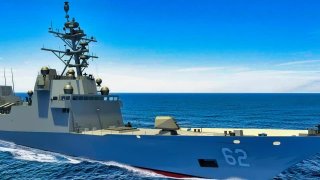The Navy's Constellation-Class Frigate Problem Has No Easy Fix
The USS Constellation (FFG-62) frigate program is doing little to refurbish the U.S. Navy’s reputation for competence. Intended to deliver a flotilla of at least twenty small, hard-hitting surface combatants in reasonably short order at manageable cost, the program is 36 months—and counting—behind schedule
What to do to restore the reputation of the U.S. Navy and the American shipbuilding complex? Start by reforming the institutional culture. Best practices lie downstream of culture. First of all, the sea service needs to rediscover its experimental ethos. A ship, or any other piece of military kit, is a hypothesis. It remains so until it proves out in the unsparing environment of the world’s oceans and seas. But again, the field trials can start small. I’m with GAO: the Constellation power plant and machinery controls should undergo testing ashore, exposing any major defects before the frigate puts to sea. Let the scientific method prevail.
Second, the service needs to rediscover an outlook that once prevailed: that good enough is good enough when fielding military hardware. The United States prevailed in World War II because industry turned out mountains of good-enough ships, planes, and tanks, whereas Axis foes were captive to a guild mindset. They built superb systems in limited numbers and were ultimately overwhelmed by Allied matériel. Give me the older way. The concept behind the Constellation class was a solid one. Namely to take a successful working vessel, install American sensors and weapons aboard it, mass-produce it, and venture out across the briny main. Instead it appears the navy leadership succumbed to the age-old human temptation to let the best be the enemy of the good.
And third, top uniformed and political leadership may need to take a heavier-handed approach to overseeing procurement. If a decision from on high directs the navy to make minor modifications to a foreign design and build a bunch of warships, senior leaders need to enforce that decision and the philosophy on which it rests. They must impose self-discipline, themselves resisting the lure of perfection. And they must impose discipline throughout the naval hierarchy.
Get the culture right, and watch U.S. maritime strategy prosper. And watch antagonists, allies, and friends take note.
About the Author: Dr. James Holmes, U.S. Naval War College
James Holmes is J. C. Wylie Chair of Maritime Strategy at the Naval War College and a Nonresident Fellow at the University of Georgia School of Public and International Affairs. The views voiced here are his alone.


